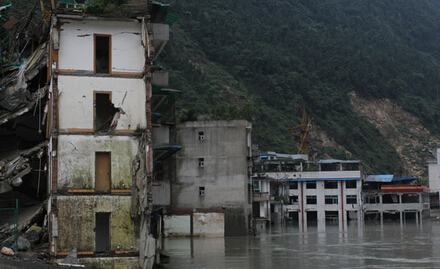During the three years Qi Zhao spent filming “Fallen City,” he captured his subject — the town of Beichuan, wiped out in the 2008 Sichuan earthquake, two-thirds of its people killed and 80 percent of its buildings destroyed — as it slowly disappeared. In time-lapse images, fields of rubble become fields of grass. Part of the old city is turned into an earthquake museum, with railings installed in front of piles of shattered concrete.
在趙琦拍攝《殤城》的三年時(shí)間里,他看著自己的拍攝對(duì)象北川縣慢慢消失。北川在2008年的四川地震中被毀,三分之二的居民死亡,80%的建筑被毀。在電影畫面中,隨著時(shí)間的流逝,瓦礫場(chǎng)變成了草場(chǎng)。舊城的一部分被改成了地震博物館,一堆堆破碎的混凝土前安上了圍欄。

“Fallen City,” showing Monday in PBS’s “POV” series, looks both forward and back. It’s a conventional aftermath story, following three families devastated by the earthquake as they deal with the emotional and logistical aftershocks: intense, sometimes paralyzing mourning along with the need to relocate while a new Beichuan is being built. But it’s also an elegy for the former Beichuan, once a picturesque town nestled along a riverbank. Mr. Qi’s subjects keep returning to the ruins to commune with their dead children, parents and siblings, and his camera lingers over the wreckage, turning the debris and the scattered buildings into misty brush paintings. (The cinematography was by Shaoguang Sun.)
《殤城》周一在PBS頻道的POV系列中播出。它既展望未來(lái),也回顧過去。它是個(gè)講述災(zāi)難余波的傳統(tǒng)故事,記錄了三個(gè)遭到地震重創(chuàng)的家庭應(yīng)對(duì)震后情緒波動(dòng)和生活安置的過程:他們情緒激動(dòng),有時(shí)因哀傷而昏厥,還要考慮重新安家的問題,當(dāng)時(shí)新北川正在建設(shè)中。不過這部紀(jì)錄片也是舊北川的挽歌,它曾是個(gè)秀麗的河畔小城。主人公們不斷返回廢墟,與死去的孩子、父母和兄弟姐妹談心。鏡頭長(zhǎng)時(shí)間停留在廢墟上,把瓦礫和破碎的建筑變成朦朧的水墨畫(該片的攝影指導(dǎo)是孫少光)。
Of the three stories, one, about a teenage boy, is touching but a little generic; his alienation can be attributed to his father’s death in the quake, but you suspect he might have turned against school and parents regardless. One, about a civil servant who lost a daughter and three sisters, has the sort of unexpected twist that’s a documentarian’s dream. And the third, about the Pengs, a likable couple who lost their only child, is simply heartbreaking. A scene in which soldiers prevent them from re-entering the old town to visit the makeshift tomb they’ve built for their daughter is brutal in its despair.
這三個(gè)故事中有一個(gè)講述的是一個(gè)十多歲的男孩,這個(gè)故事很感人,但也有點(diǎn)俗套。他的孤僻可能是因?yàn)楦赣H在地震中去世,但是你也懷疑他可能本來(lái)對(duì)學(xué)校和父母都有點(diǎn)敵視。第二個(gè)故事講述的是一個(gè)公務(wù)員,她失去了女兒和三個(gè)姐妹,這個(gè)故事有個(gè)意外的情節(jié)突變,這是紀(jì)錄片制作人們最希望遇到的。第三個(gè)故事講述的是可愛的彭氏夫婦,他們失去了獨(dú)子,傷痛欲絕。在其中一幕里,士兵們阻止他們?cè)俅芜M(jìn)入舊城探望他們給女兒修建的臨時(shí)墓地,這很殘忍,令人絕望。
Mr. Qi’s background is in Chinese television, and “Fallen City,” his first film as a director, is not the sort of formally inventive or tough-minded documentary associated with filmmakers like Wang Bing or Jia Zhangke. It’s a bit slick in its mournfulness, and it tactfully avoids subjects like the efficacy of the government’s response in the immediate aftermath of the quake. Mr. Qi makes clear, though, from his portrayal of the bleak new Beichuan and his inclusion of banal newscasts celebrating its construction that his sympathy lies with the survivors who sneak past guards and clamber over dangerous debris just to feel at home.
趙琦來(lái)自中國(guó)電視圈,《殤城》是他導(dǎo)演的第一部影片。這部電影不是王冰或賈樟柯的那種在形式上很有創(chuàng)意或者很冷酷的紀(jì)錄片。它的悲涼有點(diǎn)老套,它巧妙避開政府的震后應(yīng)對(duì)效率等主題。不過,趙琦描繪了荒涼的新北川,并加入了新聞報(bào)道對(duì)其落成的陳腐贊美,這些都清楚地表明他同情的是那些幸存者——他們偷偷繞過衛(wèi)兵,爬上危險(xiǎn)的廢墟,只是為了有家的感覺。












